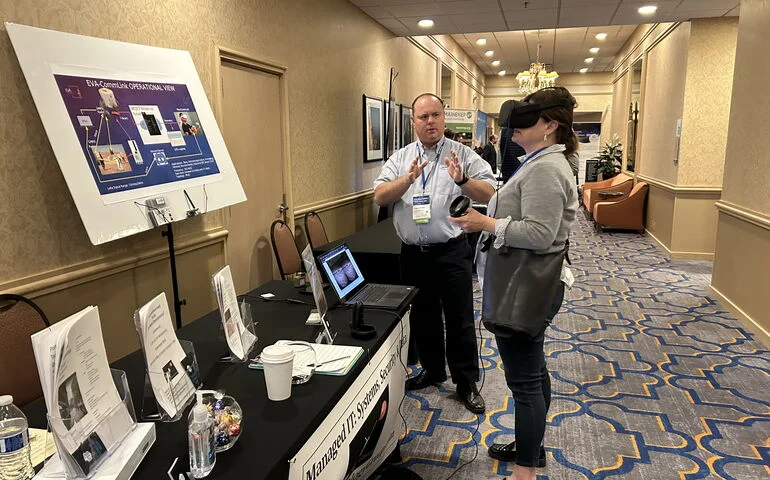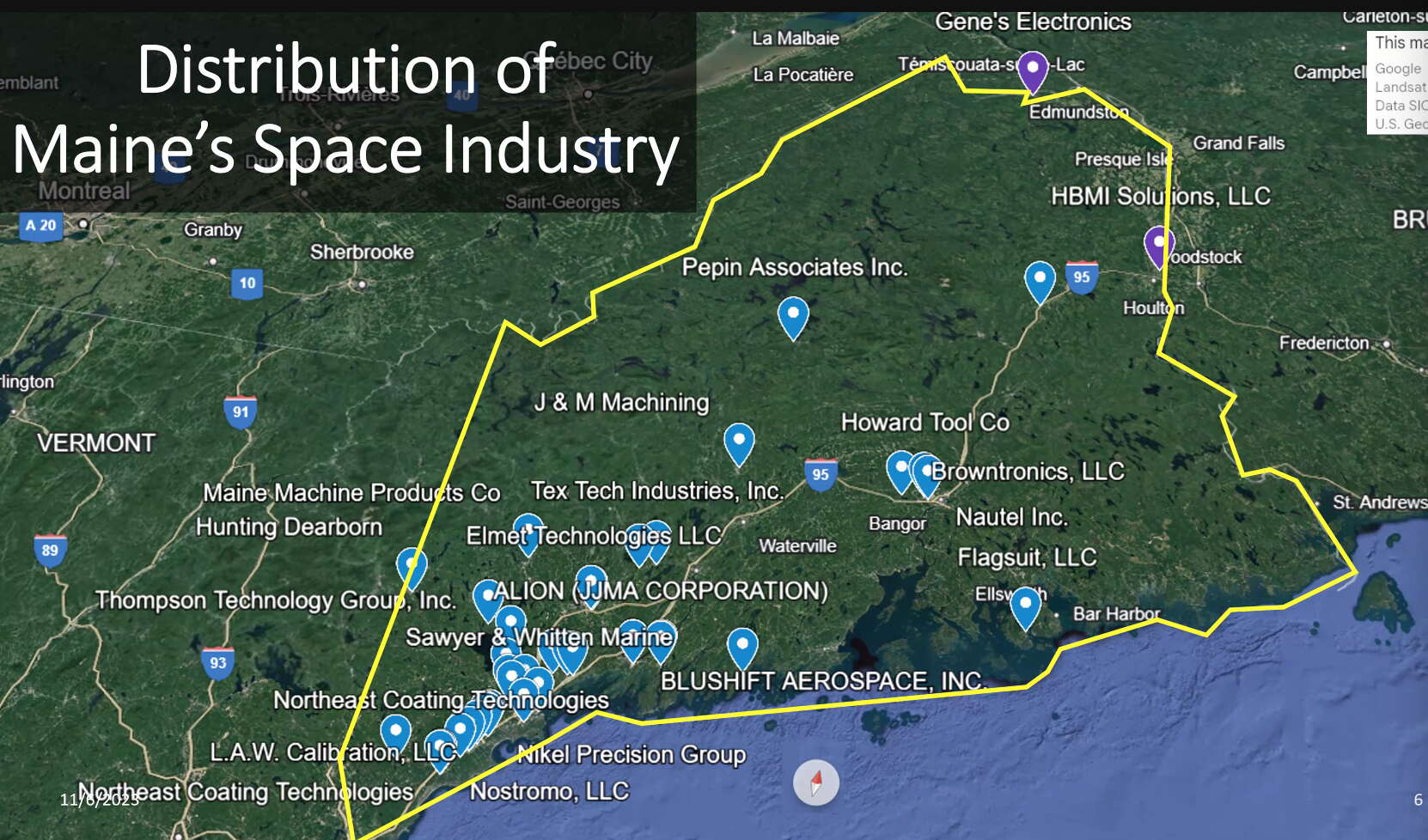Maine’s ‘bright future in space’ builds on existing strengths and new initiatives
- November 8, 2023
November 7, 2023

The inaugural Maine Space Conference, Nov. 5-7, featured exhibits along with 21 sessions on a variety of topics.
Ask most people what they know about Maine’s space industry and they usually say, “Well, do they have a rocket company?” And that’s about it, said Justin Annibali, CEO of Global Space Exchange Inc.
But Maine is essentially a thriving startup in the global space industry and has advantages that other locations don’t, Annibali continued.
He was part of a Monday panel that provided an overview of the space industry in Maine during the inaugural Maine Space Conference, convened by the Maine Space Grant Consortium as part of a statewide campaign to raise awareness of the potential of Maine’s NewSpace economy.
The conference kicked off Sunday and continued Monday with a slate of 21 sessions covering a wide range of topics, including career opportunities, research, law, finance and policy, data management and the development of a “spaceport” complex.
The conference continued Tuesday at Holiday Inn By the Bay in Portland. The event has sold more than 280 tickets, and has open registration for conference-only and virtual attendees.
For more information, click here.
Global growth
Maine is on track to be a growing contributor to the global space industry, today worth over $529 billion annually, Annibali said.
The Global Space Exchange, which hosts a database of space-focused organizations, has counted 13,000-plus organizations in the global industry, he said.
“This is more than most people realize. I think it’s closer to 20,000.”
The global space economy has grown at least 5% year-over-year since World War II, he noted. Some of that growth was driven by the space race that began in the 1960s.
“It’s a space race that is across countries around the world,” he said.
All space-faring nations — and many that haven’t yet gone there — are investing in the industry, whether through government or private investment, he said.
“The entire financial world has said, ‘Wow, space is interesting. Look at those growth rates,’” he said.
The Maine story
Those developments are the backdrop to Maine’s space industry, he said.

This map shows the distribution of some companies that take part in the space industry.
“It fits into the Maine story in many ways,” he said. “The Maine space industry is a startup” that’s already engaging in investment opportunities but has room to grow, he added.
Currently, he said, Maine’s space-related activities largely relate to companies that, from the outside looking in, are hard to tell if they’re actually doing business in space.
That’s because their primary business is non-space-related but also suits space-related requirements.
“There are quite a few more companies that we initially thought,” he said.
According to the Maine Space Grant Consortium, there are over 85 aerospace companies already operating in Maine.
Annibali said Global Space Exchange is tracking about half of those. About 10% of those companies, he said, are narrowly focused on space. The other 90% are focused on other industries or related areas, such as aerospace, which encompasses a wide range of aircraft as well as spacecraft products.
That’s a good thing, he said, because skills related to the overall aerospace industry, such as metals and composites manufacturing, can translate to the space industry.
“There’s a real strength there,” he said.
Maine has others “buildable strengths” for furthering its activities in the industry, he said.
That includes an initiative underway to develop a Maine Space Complex, with three core business units envisioned to span across several geographic locations, including a space data and advanced analytics center, an innovation hub and a launch sites and services unit.
Maine has a geographical advantage for launching small rockets and satellites into polar orbit, which are oriented north to south and provide greater exposure to land mass for data collection, contrasting with geostationary equatorial orbits at ports such as Cape Canaveral.
Maine has materials and manufacturing capability in place to supply the broader industry as a growth area that towuld be easy to take advantage of.
“And Maine is not dependent the space industry, which has had ebbs and flows over the years,” he continued. “The fact that you’re got other industry built in — it’s easy to take adjacent steps into the space industry and become suppliers.”
Looking toward the future, Annibali recommended that Maine engage in messaging about the state’s “bright future in space,” as well as create more industry connections and partner with incumbent companies that already have clear roles in the industry, in order to accelerate the path of Maine-based companies.
He said it could be useful for Maine companies to look into publically available NASA patent licensees to build on Mane manufacturing and to plug into federal research labs and innovation hubs around the country.
Additionally, he recommended that Maine promote opportunities for remote positions in order to grow the expertise for Maine’s space ecosystem, and also advertise the talent that already exists in Maine.
“Last, I’d say think big and globally,” he said.
